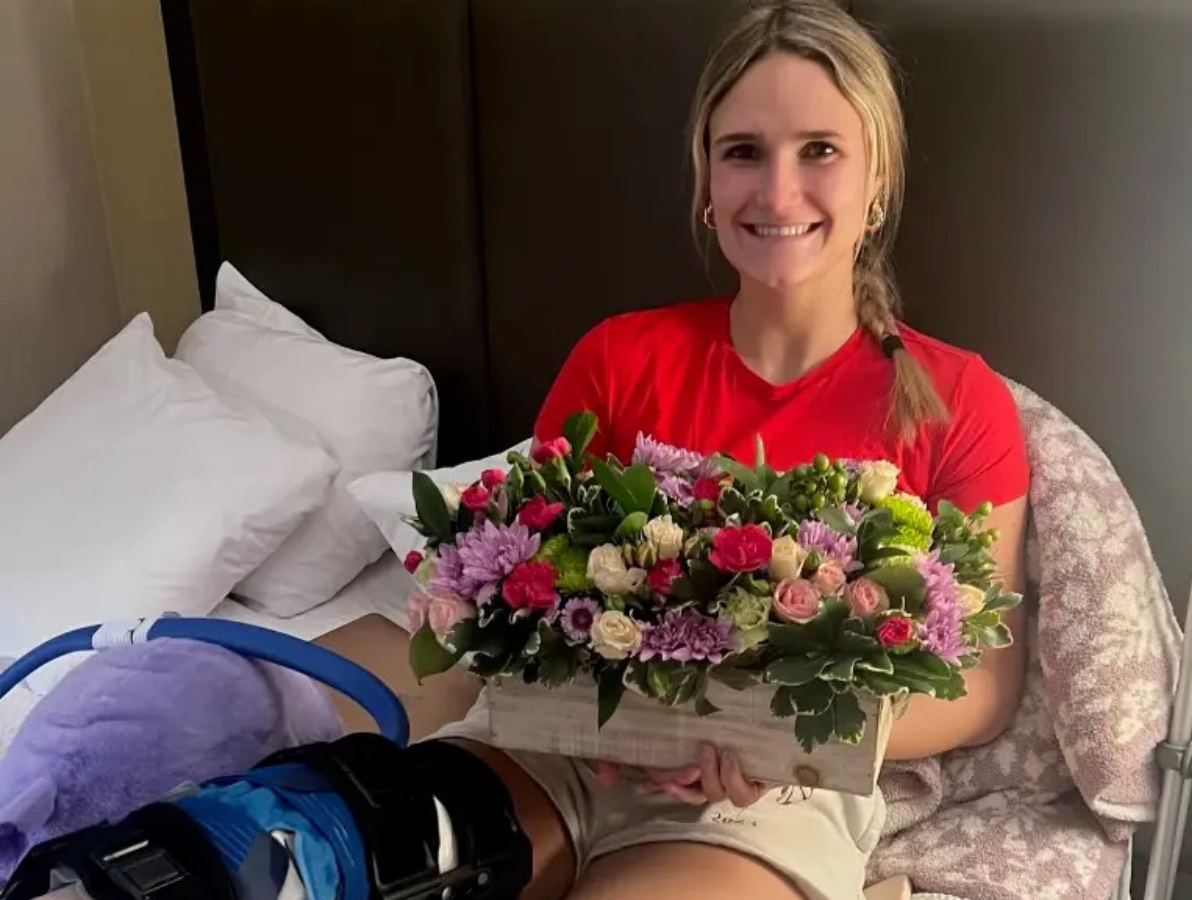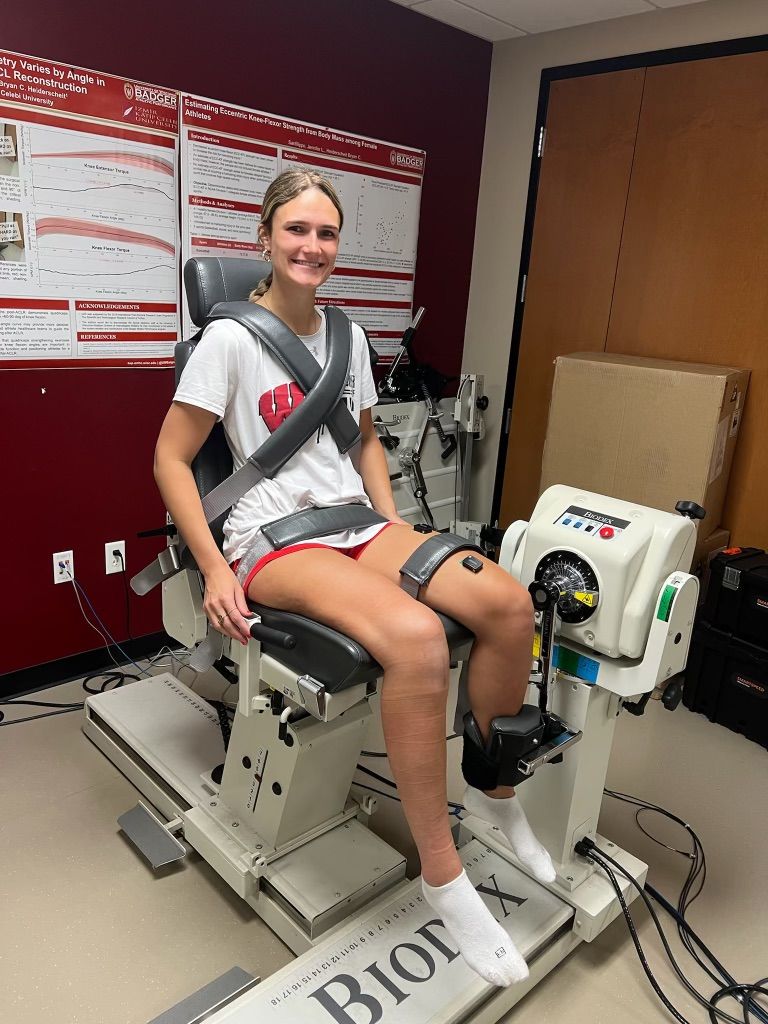Slow and Steady: What Mia Sowders learned after her ACL tear
Wisconsin soccer player Mia Sowders finds life lessons in recovery.
I thought I knew what rehabbing a torn ACL would feel like. My younger sister, Riley, tore her ACL while we were still in high school, followed by a few of my closest friends in college. It was always something that happened to other people, very serious but extremely distant.
During my senior year of high school, I severely sprained my ankle and was in a boot using a scooter, unable to put pressure on my ankle for a month. In all, I was out for three months and thought I knew what it felt like to go through a long-term injury. I struggled both mentally and physically with not being able to play soccer. Looking back, I realized it was nothing compared to the nine-month recovery process for ACL tears and all of the ups and downs along the way.
Thinking back on what I knew about ACL tears, I knew the process for recovery was long. I remember seeing Riley go through surgery and recovery with determination and grit, not once but twice. In high school, we spent hours in the car driving her to rehab; she would tell me about her workouts and about how she worked hard to set a personal record. Each day, I witnessed her positive attitude throughout all the adversity she faced. Then, she tore it again in her first month of practice at Longwood University in Virginia. Hearing her talk about how much she still loved soccer and would do anything to keep playing and seeing her positive attitude was great, but I never realized how tough it was to have that outlook despite adversity.
At Wisconsin, I've had many teammates suffer knee injuries. I remember hearing about my teammates' recovery processes and how their paths were very up and down. I have always admired how hard-working and relentless they were, but I have never considered how they were doing mentally.

Last January, during my sophomore year, spring season, I felt excited to train, work hard, and prove myself as a player. The spring season is when my coaches say that my team is storming – the seniors are gone, and other players have opportunities to step into bigger roles. In our second week back at practice, my entire spring season plan changed. When I felt that pop, the one I'd only heard about from my sister and friends, my heart sank.
I never thought it would be me.
At that moment, I knew it was my ACL. Suddenly, everything I had planned for myself for that semester and the upcoming season flipped all around.
My ACL injury changed everything. At first, I didn't want to believe it. There was that instant shock and fear. It wasn't just about missing games or not being able to run. It was about losing a part of my routine, my identity, the things I loved doing every day. I remember how helpless I felt; my plans had gone out the window, and I had no idea what to do.
These past eight months have been some of the most tiring, rewarding, and frustrating months of my life. It turns out that in addition to my ACL tear, I also tore my MCL and meniscus, and with this came a very slow recovery process. I needed to wait five weeks to get surgery to allow my MCL to heal, and then I was in a locked-out brace for six weeks post-surgery.
Those early weeks were extremely tough physically and mentally, and I do not think I ever fully allowed myself to process my injury until later in my healing. I needed help getting into Ubers because I could not lift my leg, struggled walking long distances, and could not bend my knee. And while I still wanted to be involved in things my teammates were doing, I struggled to get from one place to another. It was a very painful and isolating time. Processing began once I could walk without the brace and could see how far I had even come from the beginning. Looking back, I would say taking each day at a time and trying to find the positives in the little things were the best things to do.
When I slowly began making progress by walking without the brace and lifting weights with my lower body again, it helped me to see a little of the light at the end of the tunnel. I've had really good weeks and really bad weeks, and I am still on the road to recovery.

But as much as I hated the recovery process at first, I learned to appreciate it. I had to slow down and take things one step at a time. Little victories mean everything. Being able to bend my knee just a bit more, put weight on it again, and walk without a limp—those moments gave me hope and joy. I never thought I would be so excited to be able to go downstairs without pain.
These past eight months have been challenging, but looking back on it, it has made me physically and mentally stronger. It has forced me to go outside my comfort zone with new exercises and appreciate the little things. It has also made me love soccer even more and feel more excited to get back and play it every day with my teammates, who mean so much to me.
Every setback has taught me patience, and every small win reminded me that progress was possible, no matter how slow.
It has shown me how adversity and challenges change you. It teaches you resilience in a way nothing else can. I learned to trust the process, even when it felt like nothing was happening. Every day, I worked toward getting stronger, and little by little, I could see the progress.
I am still about two months from the standard time frame of being cleared to play full-on, but I can already tell my mindset on approaching soccer, and life has changed so much. All of it—the pain, the frustration, the endless therapy sessions—has ended up making me stronger. The injury has shown me how tough I could be.
Enjoying the little things has become crucial. Celebrating the first time I could squat, the first time I could touch my heel to my butt, the first time I could kick the soccer ball, the first day I was able to do touches at practice, the first time I could run on the ground, and even the days where I felt just a little bit less pain. It has made me appreciate the process and how hard things shape people into something better.
If you're dealing with an ACL injury, I get it—it's a battle. But stay patient, trust the process, and remember that all the hard stuff will make you better.
The key to dominating after an ACL injury is focusing on the basics:
- Strengthening your muscles
- Improving your balance
- Preventing future injuries
- Keeping your mind in the right spot through personal connections
Your body and mind need to be stronger than it was before.
You have to put in the work—build those quads, hamstrings, and glutes. Don't skip the small stuff. Prevention is key, too. Strength training, flexibility, and proper warm-ups should be part of your routine from now on. Keep yourself conditioned, and you'll reduce your risk of reinjury. Trust your training staff, AND ask questions!
It's not just about getting back to where you were. It's about coming back even stronger. This injury doesn't have to define you, it didn't define Riley, it didn't define Emma, Aidan, Erin, and both the Taylors, and it won't define me —it can be the thing that propels you forward, that makes you smarter, tougher, and more determined. Seeing and talking with my teammates and my sister, we have said that ACL rehabilitation makes you come back an even better soccer player than you were before.
